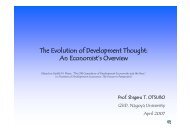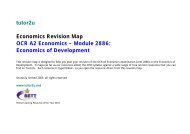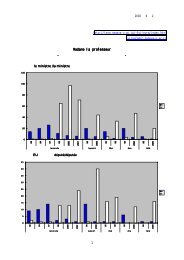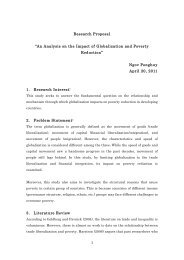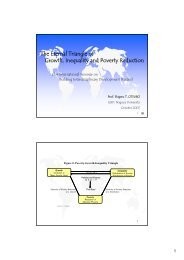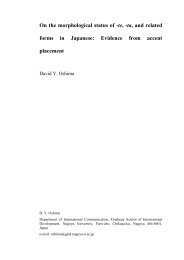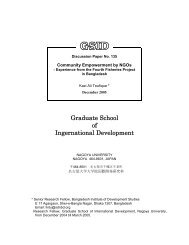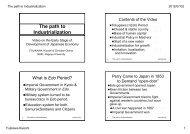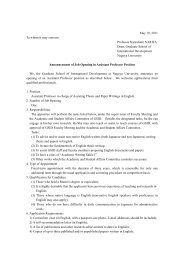Report
Report
Report
Create successful ePaper yourself
Turn your PDF publications into a flip-book with our unique Google optimized e-Paper software.
132 QUANTIFICATION OF BENEFITS FROM ECONOMIC COOPERATION IN SOUTH ASIA<br />
Like in construction services, there is a reasonable<br />
scope to develop MRAs in tourism services for the free<br />
movement of teachers/trainers and tourism professionals<br />
in all seven SAFTA member countries. These<br />
countries can work out equivalence of qualifications<br />
and negotiate MRAs in the sector. As per the available<br />
information, all SAFTA Asian countries (barring<br />
perhaps Bhutan) have hotel/hospitality management<br />
institutes both in public and private sectors. In this<br />
regard, the initiatives taken by the ASEAN would be a<br />
good example to follow. ASEAN activities to strengthen<br />
human resources development include the following<br />
approaches to cooperation: develop minimum common<br />
competency standards for ASEAN tourism professionals;<br />
develop an intra-ASEAN curriculum exchange<br />
programme with cross-training and cross-certification;<br />
prepare the ASEAN tourism training and education<br />
network directory (ESCAP 2005:15).<br />
Besides MRAs, efforts should be made to create a<br />
common tourism area in the South Asian region. Once<br />
again the ASEAN example can be of some help. ASEAN<br />
has undertaken a number of activities in support of<br />
regional cooperation among its 10 member countries<br />
(ESCAP 2005). ASEAN cooperation in tourism<br />
infrastructure development and investment has included<br />
publishing the ASEAN Tourism Investment Guide and<br />
providing relevant investment information on the<br />
ASEANWEB. Recent ASEAN cooperative activities to<br />
facilitate regional travel include publishing Wonders<br />
of Southeast Asia – An Official Guide to Thematic Tour<br />
Packaging; implementing the Visit ASEAN Campaign;<br />
publishing the ASEAN Map with general information<br />
on major tourism destinations; and drafting the<br />
framework agreement on visa exemption for Nationals<br />
of ASEAN Member States.<br />
In this direction SAARC has also taken a few steps.<br />
According to the SAARC Information Centre, the<br />
technical committee (TC) 10 was established in 1991<br />
to promote cooperation in the field of tourism in the<br />
region. At its first meeting held in Colombo in October<br />
1991, the Committee decided on an action plan on<br />
tourism to promote cooperation in the areas such as<br />
training programmes, exchange of information, joint<br />
promotion, joint venture investment, intra-regional<br />
tourism, etc. It also reviewed progress on the SAARC<br />
Scheme for Promotion of Organised Tourism. Under<br />
TC10, member countries have exchanged information<br />
on training facilities existing in the region and a number<br />
of slots for providing training in the field of tourism<br />
and hotel management were offered. TC10 has decided<br />
to produce joint tourism brochure. Emphasis is also<br />
being placed on the importance of early launching of<br />
the SAARC scheme for promotion of organised<br />
tourism.<br />
As part of SAARC initiatives, efforts are being made<br />
to reduce barriers to regional tourism trade. As already<br />
noted, there are inbound and outbound flows of tourists<br />
taking place among South Asian countries. India is one<br />
of the largest markets for Nepal and Sri Lanka.<br />
Similarly, Sri Lanka, Nepal, Bangladesh and Bhutan<br />
are markets for India. In 2003, India and Sri Lanka<br />
signed a Memorandum of Understanding (MoU) to<br />
develop tourism for mutual benefits of two countries.<br />
However, instead of signing bilateral agreements, which<br />
is a very time consuming exercise and instead all<br />
countries should try to sign a common agreement is<br />
they are to reap the benefit from tourism trade.<br />
Tourism offers enormous opportunity to gain at<br />
regional level. India has hotels in Sri Lanka, Nepal,<br />
Bhutan and the Maldives and likewise, Sri Lanka has<br />
motels operating in India. However, there a number of<br />
barriers to the supply of tourism services. Under Mode<br />
1 since India, Pakistan, Sri Lanka, Bangladesh and<br />
Nepal have some capability in information technology<br />
– though at varying level – warranting all countries to<br />
have no restrictions at all under this mode. Similarly,<br />
there is no reason why any country from this region<br />
should have any restriction under Mode 3. Even if they<br />
have any difficulty they should make this mode barrier<br />
free for SAFTA countries when they expand the scope<br />
of SAFTA by including services. Mode 3 is also<br />
important from the point of view quid pro quo as LDCs<br />
can gain Mode 4 access by offering market access under<br />
Mode 3. A common feature emerging from the region<br />
is that there is a dearth of quality tourism professionals<br />
in almost all South Asian countries.<br />
The South Asian region is far away from important<br />
tourist generating rich countries. This places the region<br />
in a disadvantageous position. In order to overcome<br />
this advantage all economies of the region needs to<br />
integrate to gain from one-another’s markets. Regional<br />
integration will increase the size of markets and will<br />
have multiplier effects on various other sectors. As Sri<br />
Lanka has been doing, all South Asian countries ought<br />
to offer the facility of visa-on-arrival for tourists from<br />
the region. In fact, South Asia will gain most if every<br />
willing person from the region is allowed to enter in all<br />
other countries by just having a valid passport. Some<br />
concessions to the tourists from the region will also go<br />
a long way in creating better business in tourism.




